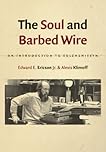 The Soul and Barbed Wire: An Introduction to Solzhenitsyn by Edward E., Jr. Ericson
The Soul and Barbed Wire: An Introduction to Solzhenitsyn by Edward E., Jr. EricsonThe Soul and Barbed Wire, by Edward Ericson, Jr. and Alexis Klimoff, is a very good introduction to the life and work of one of the most important, and misunderstood, artists of the last century. It includes several long essays (on his life, his beliefs, and his reception) and a number of short analyses of his most important works, which make up the bulk of the book. There is also a pretty good selected bibliography.
Solzhenitsyn is a difficult writer to understand. His output was enormous—his collected works in Russian is projected to be 30 volumes—consisting of poetry, short stories, long novels, journalism, memoirs, history, and public speeches, and often his works defy genre classification. He has a reputation as being the most important writer of the 20th century, but has also suffered from a good deal of criticism for not being all things to all people. His critique of Western liberal materialism was resented, even as his critique of Soviet totalitarian materialism was praised. Many western critics have seemed to willfully misunderstand him, painting him as a nationalist and monarchist (and sometimes worse) with little to no evidence, textual or otherwise. A strange sort of nationalist is one who repeatedly pleads his nation to repent and embrace self-limitation! I suspect the reason he has often been confused with a nationalist is that he so thoroughly and unequivocally loved Russia. The love of place, of home, is incomprehensible to the modernist temperament which so often takes refuge in the abstract. Particularly in our own time, when the language of patriotism has been so debased, it is hard for certain sorts of Americans to take seriously the notion of loving country. It seems to me, though, that true dissent can only be honorable when it is rooted in love of country. It is precisely that sort of patriotic dissent which Solzhenitsyn exemplified, both before and after the fall of the Soviet regime. For this reason alone some familiarity with the broad spectrum of his work is worthwhile, and it is nice that there is a relatively slim volume is available as a guide.
The authors of The Soul and Barbed Wire are unapologetically glowing in their praise of both Solzhenitsyn’s life and his works. He is portrayed a hero, which I think is fair but not everyone does. If you don’t share this view, all the approbation might rub you the wrong way. Or maybe you’ll be convinced to reexamine your position. I’m not sure. (Personally, I think that if a writer’s work offends the sensibilities of Marxists, Anglo-American liberal elites, as well as neoconservatives, he must have done something right). The authors do a pretty good job at convincing the reader that Solzhenitsyn was not a political writer, that to understand him one must take his moral and spiritual worldview seriously.
The prose is a bit academic, though not in a bad way, and the because of the structure of the book there is a lot of repetition. Not everyone will want to read it strait through from cover to cover, but I’m glad I did. It is the kind of intro that makes you want to explore the subject further, while serving also as a good reference work. I'm going to keep it on my shelf, ready to hand.
Solzhenitsyn, though a provocative political thinker, was first an artist and the authors, thankfully, spent a lot of time on the literary quality of his work. For a while I’ve been a fan of his political and moral outlook, but I have never read much of his fiction. Before I read this book I did want to read Solzhenitsyn’s long fiction, but mostly because it seems like the right thing to do. After finishing The Soul and Barbed Wire, I’m now actually looking forward to picking up The First Circle, The Cancer Ward, and August 1914.

No comments:
Post a Comment